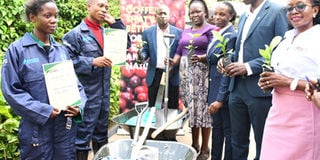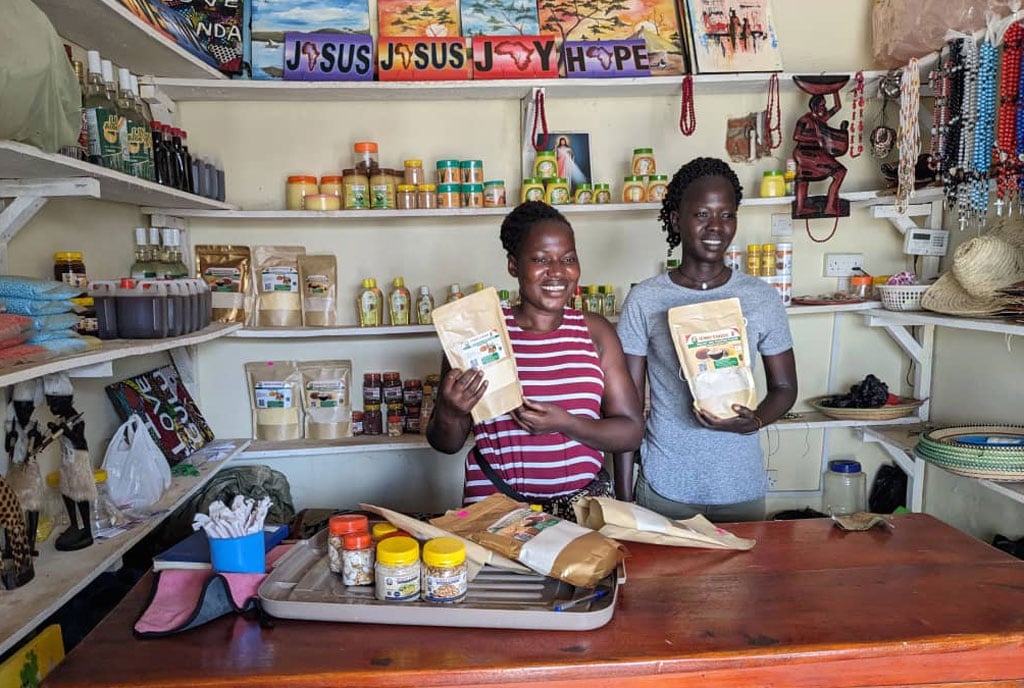Govt asked to stop child labour in coffee value chain

The Bukomansimbi District Chairperson, Mr Fred Nyenje Kayiira (C) hands over certificates and equipment to some of the youths skilled in farming practices on April 25, 2024. PHOTO | ANTONIO KALYANGO
What you need to know:
- The Bukomansimbi District Chairperson, Mr Fred Nyenje Kayiira, noted that the problem of child labour is a serious one because of high poverty rates in the community.
Activists in the coffee industry have asked the government through the ministries of Agriculture and Gender, Labour and Social Development to eradicate child labour in the production and supply chain.
Ms Rashidah Nakabuga, the country director of Rainforest Alliance, says keeping children in the coffee supply chain may affect Uganda’s chances of increasing its coffee volumes on the European market. Rainforest Alliance is an NGO that promotes environmental conservation and human rights.
“There is a new EU policy that requires every supply chain actor to ensure that no children are involved in the coffee value chain, but it’s not yet accorded attention, yet coffee means a lot to our economy and it does not deserve any setback,” she said on Thursday while addressing stakeholders during the passing out of over 250 children from the districts of Bukomansimbi and Kyotera who were equipped with vocational skills.
Earlier this month, the European Parliament passed the Corporate Sustainability Due Diligence Directive which applies to even non-members. The policy mandates companies and all actors to assess and mitigate human rights and environmental issues, child labour inclusive.
In a bid to influence a shift towards sustainable and accountable business practices, non-compliant parties are likely to suffer far-reaching implications for their businesses on the European market.
Mr Paul Jjita, the project support consultant at Rainforest Alliance, said their intervention of skilling and equipping former child labourers should be an eye opener to the government to take necessary action.
“We have worked with district leaders, farmers and processors in Greater Masaka and in Rwenzori sub-region, we shall keep supporting all actors to comply as the government plays its role too,” he stated.
The Bukomansimbi District Chairperson, Mr Fred Nyenje Kayiira, noted that the problem of child labour is a serious one because of high poverty rates in the community.
“Our focus should be on ensuring that all children are at school, but several factors, mainly poverty are complicating the efforts; however, through joint efforts, we can address it,” he said.
Beneficiaries led by Fahad Katongole, a resident of Kakuuto sub-county in Kyotera who learnt motorcycle repair, said he has been working from coffee shambas since he left school during the first COVID-19-induced lockdown in 2020.
“With the coming of projects like palm growing and crude oil pipeline, more children are likely to drop out of school in search of quick money, but with this acquired knowledge, I am also going to mobilize some stranded children and equip them with the same skills,” he noted.
According to Unicef’s recent report, 160 million children are trapped in child labour worldwide of which 79 million perform hazardous work.




